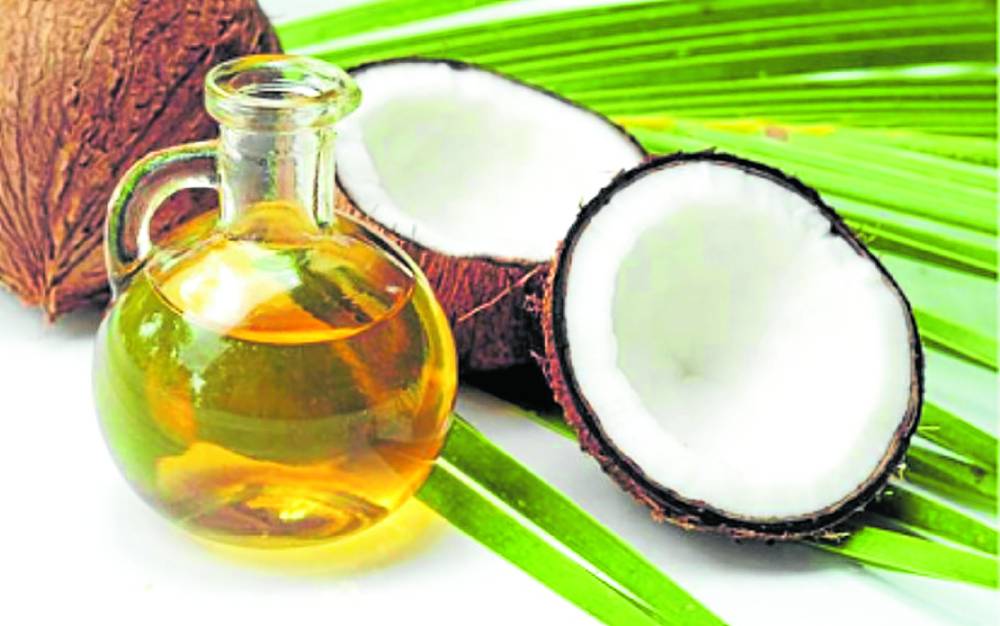
LAB TESTED Not a COVID cure, but a proven reliever. —CONTRIBUTED PHOTO
Virgin coconut oil (VCO), whether mixed with meals or directly consumed, can help hasten recovery from symptoms and infection among Covid-19 patients, according to two clinical trials conducted by the Department of Science and Technology (DOST).
The DOST, however, cautioned the public not to consider VCO as a cure for Covid-19 but only as an “adjunct treatment,” or supplement to other drugs, such as antivirals and antibiotics.
The second study, conducted last year among Covid-19 patients in Valenzuela City, confirmed the findings from the first that was conducted in 2020 on similar patients in Santa Rosa, Laguna province, Science Secretary Fortunato de la Peña said at a media briefing on Friday.
Both studies involved cases with mild to moderate COVID-19 symptoms, such as fever, cough, colds, body ache and headache, as well as loss of taste and smell.
These maladies were gone by their 14th day of taking VCO doses, De la Peña said, or 12 days faster than the patients in the control group who were not given coconut oil and recovered from their symptoms only on the 26th day from the start of the study.
The second study involved 77 Covid-19 patients of Valenzuela City Emergency Hospital—39 of whom received VCO, while 38 did not—who underwent a 28-day intervention last year.
Immediate relief
Led by the DOST’s Food and Nutrition Research Institute (FNRI), the two trials used the randomized single-blind, open-label method, wherein the participants and the hospital staff knew they were taking the VCO, but the research team didn’t know the grouping or who were part of the experimental and control groups.
The Valenzuela study served as a follow-up to a similar VCO trial conducted among suspect and probable Covid-19 patients in Santa Rosa in 2020.
Patients in the Valenzuela experimental group were each given 0.6 milliliters per kilogram of body weight of VCO in medicine cups for the first three days to let their gut adjust. The amount was later increased to 1.2 mL/kg BW from Day 4 to 28. The same dosage was given to their Santa Rosa counterparts.
In a presentation, De la Peña said immediate relief of symptoms were shown by seven, or 18 percent, of the 39 patients who received VCO doses by Day 2. Meanwhile, only four, or 10.5 percent, of the 38 patients in the control group experienced relief from symptoms by the second day.
The diminishing signs and symptoms of COVID-19 among patients in the VCO group was supported by the decreasing levels of C-reactive protein (CRP) among the patients. CRP is a quantitative marker used in monitoring inflammation or infections. CRP levels of less than 5 milligrams per liter of blood indicate no infection or inflammation.
Average CRP levels of the VCO group normalized to 5 mg/L or less as early as Day 14, and continuously decreased until Day 28. On the other hand, normalization of CRP levels in the control group only reached normal levels on Day 28.
“In conclusion, VCO can be an effective adjunct therapy in managing COVID-19 signs and symptoms, whether mixed in nutritious meals or taken separately,” the DOST chief said. Both trials “confirmed that VCO hastens the resolution” of COVID-19 symptoms, he said.”
Boon to coco industry
According to De la Peña, the results of these studies could prove to be a boon to the country’s coconut industry and related enterprises.
Based on studies by the Philippine Coconut Authority (PCA), there are five hybrids (PCA 15-8, SYN VAR, PCA 15-9, PCA 15-3, PCA 15-2), five tall varieties (BAYT, SNRT, TAGT, BAOT, LAGT) and one dwarf variety of coconut suitable for VCO production.
The DOST trials were headed by FNRI Director Imelda Angeles-Agdeppa, with Jacus Nacis, Fabian Dayrit and Mario Capanzana as coinvestigators. Another research team was composed of FNRI scientists Carmina Alicia Lainez, Johnalen Aira Soberano and Janine Marie Dariagan, and statistician Keith Tanda.
The Valenzuela study also involved the DOST’s National Capital Region office and another attached body, the Philippine Council for Health Research and Development (PCHRD); Ateneo de Manila University (Admu), the PCA and the Valenzuela City government.
The two studies were based on earlier research by Dayrit, a coconut expert and Admu professor emeritus, on the potential use of VCO as an antiviral agent. It was coauthored by Dr. Mary Newport of Spring Hill Neonatology in Florida.
The DOST-PCHRD is currently studying the use of VCO as a nasal spray or gargle for Covid-19 patients.

